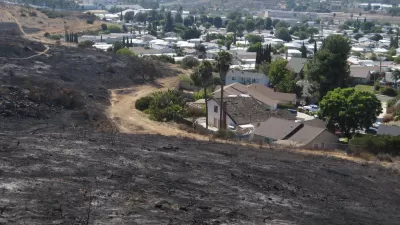Local governments and utilities are overexposed and underinsured relative to an increasing threat from severe weather events. The Brookings Institution has released a report on a new funding tool to help meet these challenges.
"One way for cash-strapped local governments to increase both protection and insurance against disasters is through a new financial tool called resilience bonds," according to a post by Shalini Vajhala.
Vajhala and colleague James Rhodes recently produced a report titled "Leveraging Catastrophe Bonds as a Mechanism for Resilient Infrastructure Project Finance" [pdf]. The idea behind the report "is to link insurance coverage that public sector entities can already purchase (such as catastrophe bonds) with capital investments in resilient infrastructure systems (such as flood barriers and green infrastructure) that reduce expected losses from disasters." Both the report and the article compare the connection between infrastructure and insurance with healthcare. Having life insurance or health insurance doesn't make people healthier, just like catastrophe bonds don't reduce physical risks.
"Resilience bonds," according to Vajhala, "combine these two different types of investments by modifying traditional catastrophe bonds to provide insurance savings that can be captured as rebates to invest in resilient infrastructure projects." The article includes more detail on why cities should be paying attention to resilience bonds.
FULL STORY: Financing infrastructure through resilience bonds

Maui's Vacation Rental Debate Turns Ugly
Verbal attacks, misinformation campaigns and fistfights plague a high-stakes debate to convert thousands of vacation rentals into long-term housing.

Planetizen Federal Action Tracker
A weekly monitor of how Trump’s orders and actions are impacting planners and planning in America.

Chicago’s Ghost Rails
Just beneath the surface of the modern city lie the remnants of its expansive early 20th-century streetcar system.

Bend, Oregon Zoning Reforms Prioritize Small-Scale Housing
The city altered its zoning code to allow multi-family housing and eliminated parking mandates citywide.

Amtrak Cutting Jobs, Funding to High-Speed Rail
The agency plans to cut 10 percent of its workforce and has confirmed it will not fund new high-speed rail projects.

LA Denies Basic Services to Unhoused Residents
The city has repeatedly failed to respond to requests for trash pickup at encampment sites, and eliminated a program that provided mobile showers and toilets.
Urban Design for Planners 1: Software Tools
This six-course series explores essential urban design concepts using open source software and equips planners with the tools they need to participate fully in the urban design process.
Planning for Universal Design
Learn the tools for implementing Universal Design in planning regulations.
planning NEXT
Appalachian Highlands Housing Partners
Mpact (founded as Rail~Volution)
City of Camden Redevelopment Agency
City of Astoria
City of Portland
City of Laramie




























